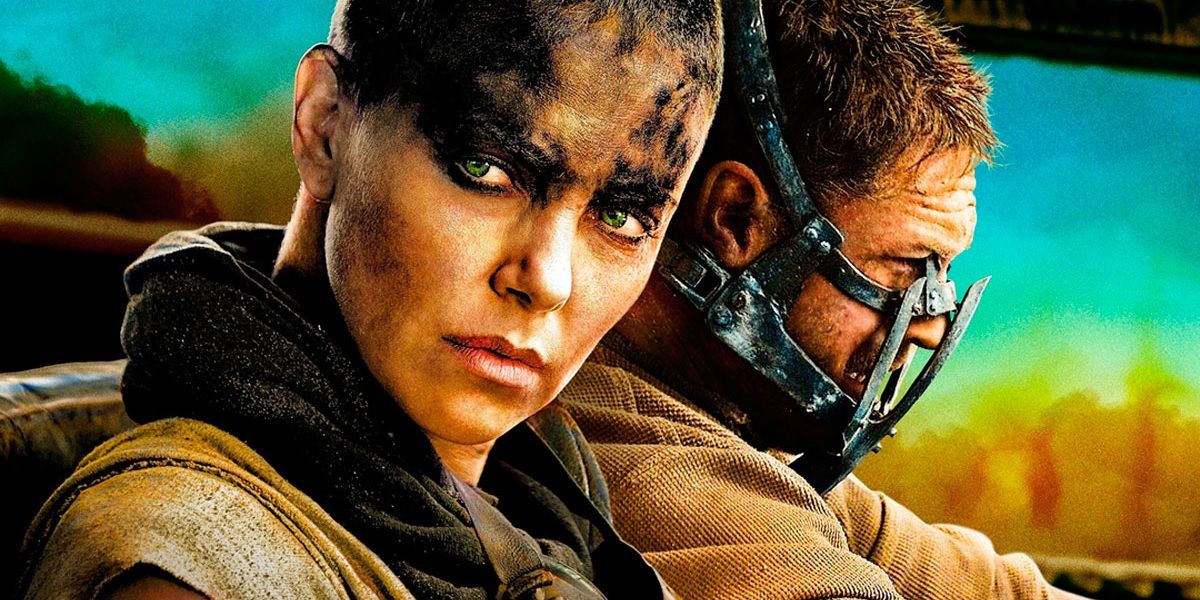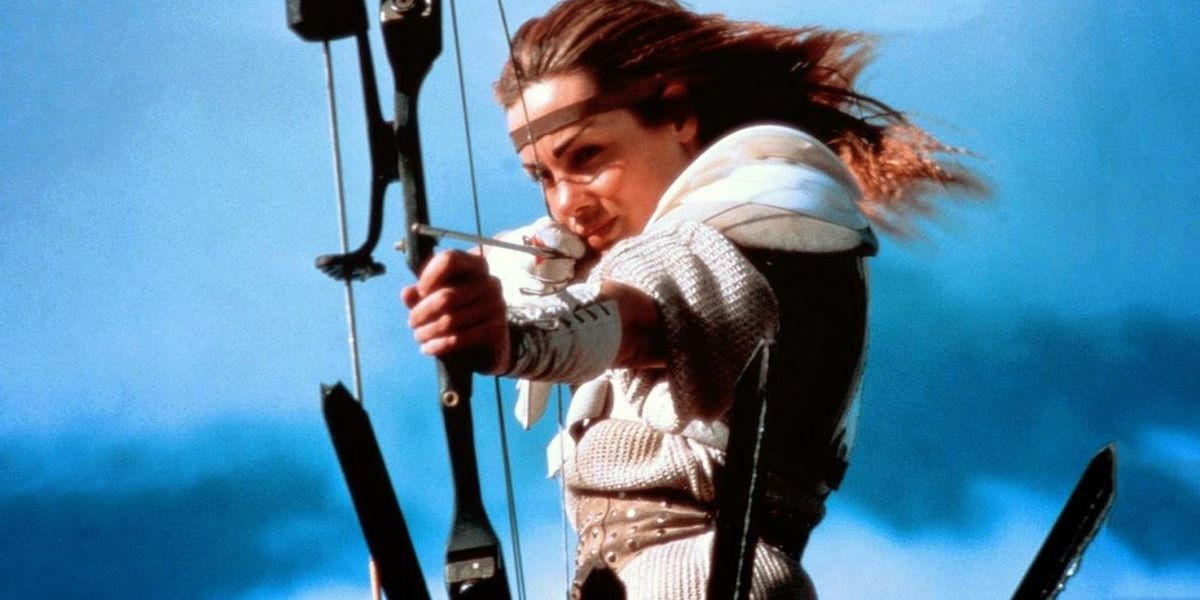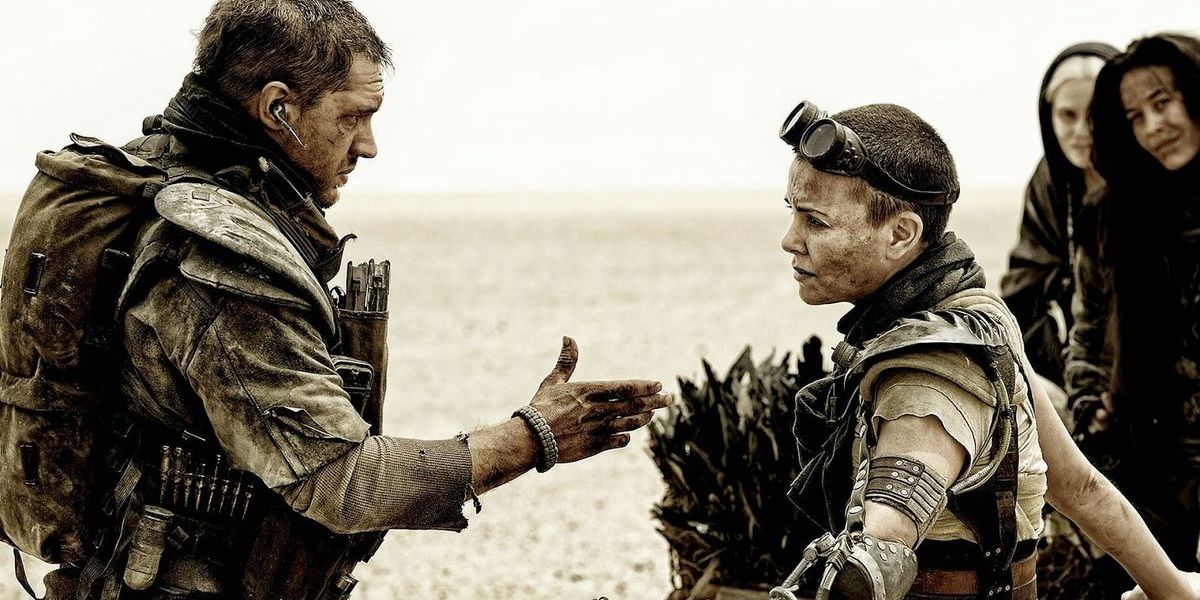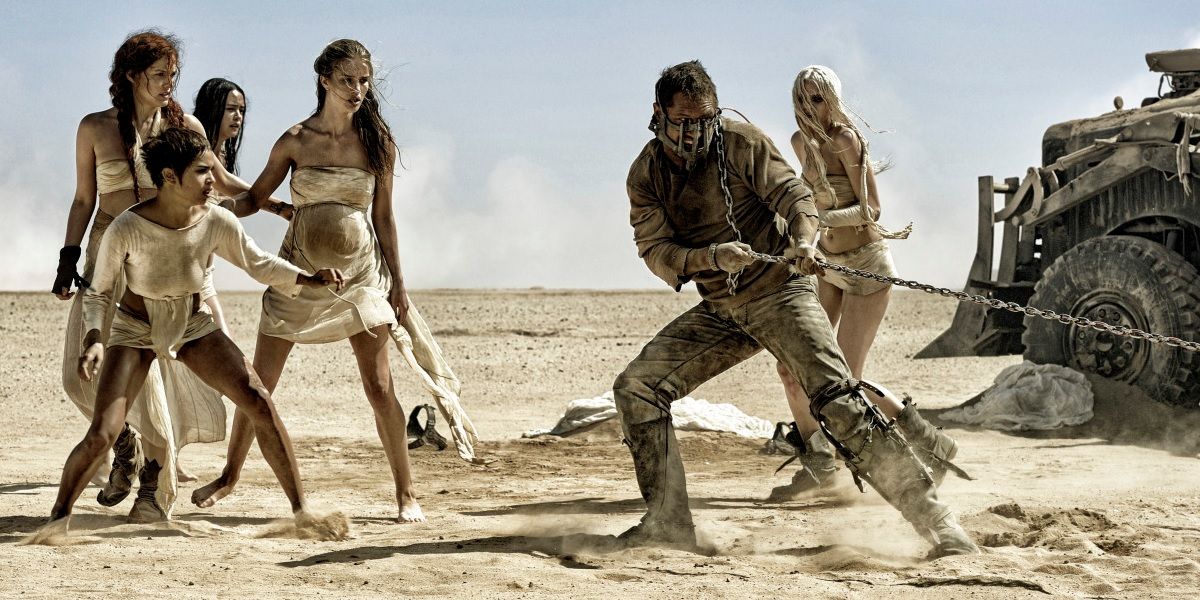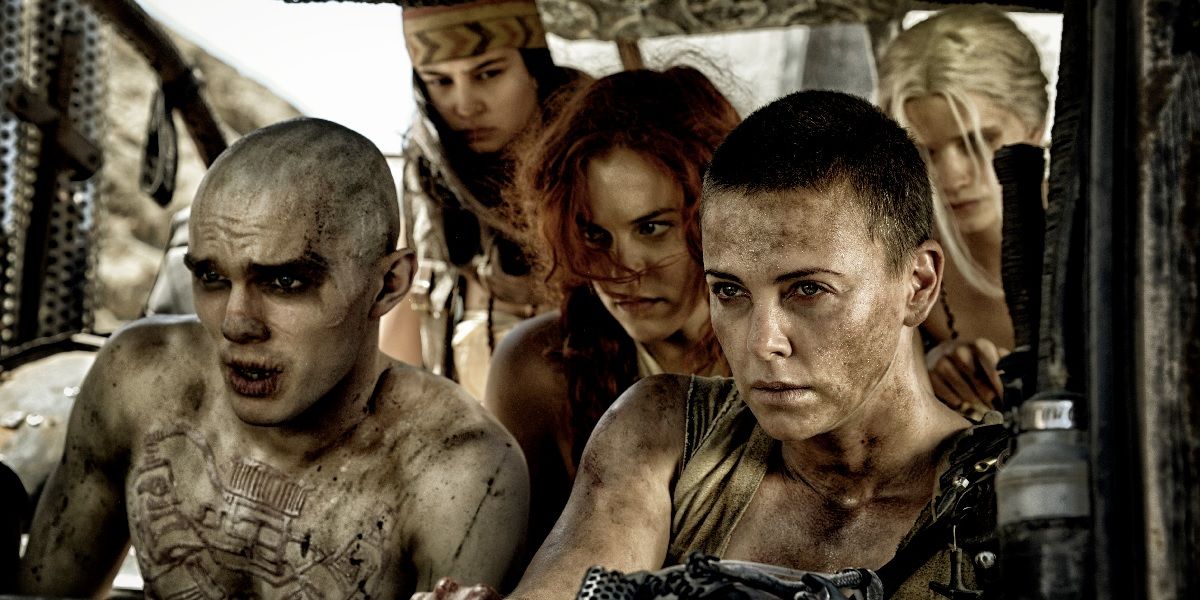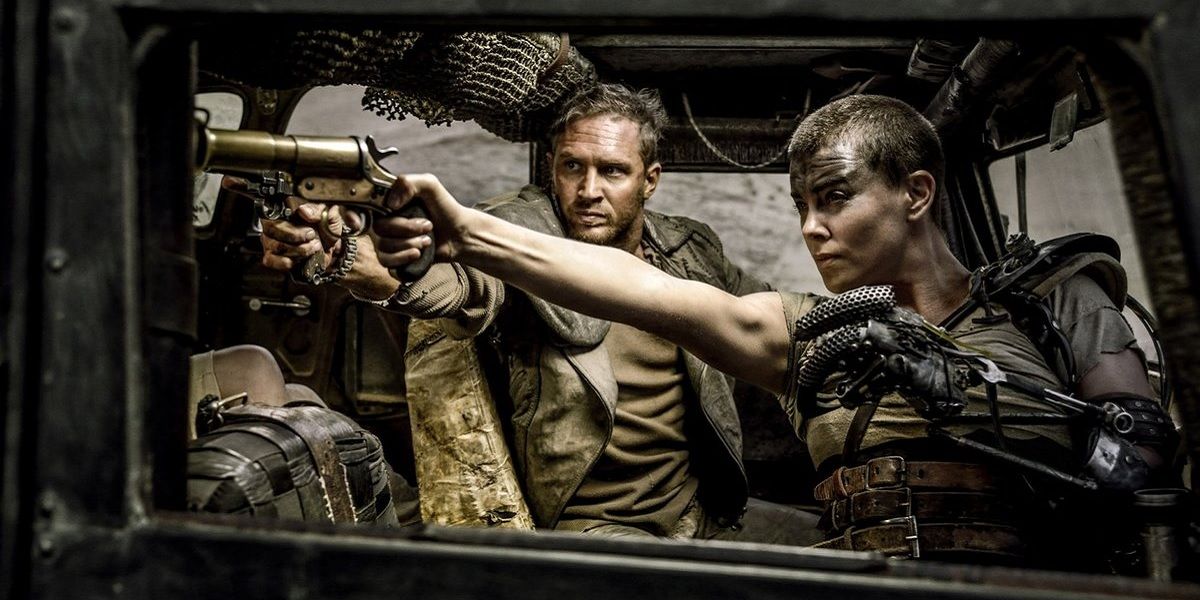[Warning: This article contains minor SPOILERS for Mad Max: Fury Road]
-
Mad Max: Fury Road is an insane, face-melting, two-hour vehicular chase through Hell filled with every ridiculous and awesome idea that director George Miller has managed to dream up over the course of three decades. It is also, depending on who you listen to, either a fun feminist action film or insidious feminist propaganda designed to lure men in with the promise of fire tornadoes before brainwashing them into submitting to female oppression.
The former claim comes from playwright and feminist Eve Ensler, who worked on the film as a consultant. The latter claim comes from "a blog for heterosexual, masculine men," in a post that warns moviegoers about the dangers of being seduced by Mad Max: Fury Road's glorious, glorious trailers.
It's worth noting that the author of that blog post admits to not having seen Mad Max: Fury Road, and also doesn't appear to have seen any of the other films in the series. This isn't stated outright, but he refers to the franchise as "a piece of American culture" (it's very much Australian), insists that "Nobody barks orders to Mad Max" (actually quite a lot of people do), and seems to believe that the Mad Max films have always been a bastion of heteronormativity (two words: assless chaps).
That particular editorial has already been very thoroughly derided by other outlets, but the description of Mad Max: Fury Road as a feminist movie - whether used as praise or insult - does raise the interesting question of what exactly constitutes a 'feminist' movie? Is there a checklist? Is there an algorithm? Is there a governing body that decides these things?
One of the issues with describing any creative work as 'feminist' or 'not feminist' is the inherent assumption that every film should be given a definitive thumbs-up or thumbs-down. Not only is the thumbs-up-or-thumbs-down approach incredibly difficult to settle, given how inclined feminists are to disagree with one another, it's also incredibly boring.
No, really. Of all the fascinating ways in which feminist analysis can be applied to film, bickering over whether or not it passes an arbitrary 'Feminist or Not?' test is mind-numbingly dull and pointless by comparison. It's almost as dull and pointless as the debates over whether Marvel is better than DC, or whether PlayStation is better than Xbox. Unfortunately, much like those debates, some people never seem to get bored of obsessing over it.
Is Mad Max: Fury Road Feminist?
Mad Max: Fury Road's youngest female actor is Coco Jack Gillies, who was around 8 years old at the time of filming, and its oldest female star is 78-year-old Melissa Jaffer. Around half of the female cast is over the age of 50. It's the kind of diversity that's rarely seen within the action genre, and it's just one of the things that makes Mad Max: Fury Road's approach to gender so rare and groundbreaking.
What's noteworthy about Mad Max: Fury Road isn't that it features strong female characters. Plenty of action movies have done that, whether in iconic roles like Ellen Ripley and Sarah Connor, or in token attempts at gender parity by giving the leggy love interest (and only prominent female character) a scene in which she kicks ass and the male protagonist stares at her, temporarily dumbstruck by her grrrl power.
In short, most action movies empower their female characters by gifting them with a few traditionally masculine traits, offering a surface level dose of apparent equality while also not upsetting the bedrock notion that traditionally masculine traits are good and traditionally feminine traits are bad. As an example, think of Hit Girl sneering "take your tampon out, Dave" in Kick-Ass 2, or any movie in which a female character mocks a male character by calling him a "bitch" or a "pussy." It's an odd kind of empowerment that relies on using femininity as an insult.
By contrast, Mad Max: Fury Road empowers its many female characters through a positive framing of traditionally feminine traits. The entire reason for the movie's lengthy desert chase is Immortan Joe's determination to retrieve his "property": women who are enslaved but also revered for their ability to create healthy new life.
Of course, Joe doesn't care about his wives as people. He values their breeding function only and considers them little more than objects (this attitude is not uniquely applied to female characters; Max himself spends the first act of the movie as a "blood bag"), but the wives take control of their bodies and end up weaponizing their wombs. They are protected by the knowledge that the Immortan's fighters daren't harm them, because they are precious cargo. At one point the wily Angharad actually uses her heavily pregnant belly as a shield to protect Furiosa.
Even traditionally feminine traits that the Immortan has little regard for are shown to have crucial value. The wives' capacity for mercy and compassion leads them to spare the life of the sickly, stray War Boy Nux, who in turn becomes instrumental in their escape. Themes of reproduction come into play once again when the wives meet the Vuvalini tribe and the Keeper of the Seeds, a woman who has been doggedly attempting to get plants to grow in the sour, poisoned earth of the post-apocalyptic future.
Moreover, even as Mad Max: Fury Road seemingly celebrates traditionally masculine traits like violence and aggression, it also condemns them in none-too-subtle ways. One of the wives' mantras is "Who killed the world?" - a reference to the fact that the war and greed which destroyed their homeland was spearheaded by men - and when the Keeper of the Seeds proudly tells The Dag that she has killed every person she ever met with a headshot, The Dag isn't impressed. "I thought somehow you girls were above all that," she says wryly.
It's an achievement in its own right that all of this unique, thought-provoking and nuanced commentary on femininity and masculinity is conveyed within a movie that has more explosions than dialogue. A thoughtful vision of gender roles in a post-civilization society sits comfortably alongside a mobile rock band and a scene in which desert-dwellers on motorcycles perform stunt jumps in order to drop grenades onto the hood of Furiosa's War Rig.
While the initial response from feminist writers has been largely positive, it probably won't be long before counter-opinions begin to crop up. Gender abolitionists might bristle at the way Mad Max: Fury Road flirts with gender essentialist ideals. Intersectional feminists may lament the limited amount of racial diversity in its cast. Still others might object to the wives' partial reliance on male characters to help achieve their goal of liberation. All of these discussion points are perfectly valid and worth talking about.
It could be argued that some of the most interesting conversations about feminism and gender in cinema have blossomed from the fundamental question of 'Feminist or Not?' Yet it's important to remember that the question itself doesn't actually need to be answered; it's merely one of many critical scalpels that can be used to dissect a text. Getting too bogged down in quarreling over a 'thumbs-up' or 'thumbs-down' score just leads to discussions that ultimately go nowhere.
Take, for example, the woeful misapplication of the Bechdel Test - an otherwise useful tool for measuring overall trends of gender representation in the film industry - as a means by which to measure whether or not individual movies qualify as feminist or not. Even the Mako Mori Test, an alternative proposed after the release of Pacific Rim to try and make up for the shortcomings of the Bechdel Test, treats feminism in film as though it were quantifiable rather than subjective. There is no shortcut for this discussion, nor should there be.
Mad Max: Fury Road might be considered this year's Gone Girl: a movie that isn't afraid to play with notions of gender and to progress the ongoing dialogue about portrayals of both men and women in Hollywood. This is what action filmmaking looks like when characters aren't written as male by default.
Mad Max: Fury Road is in theaters now.

